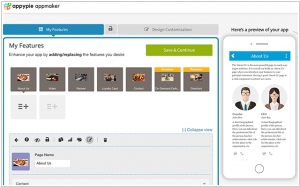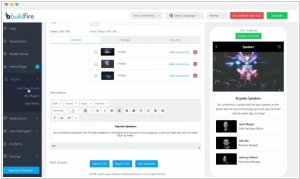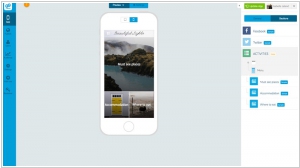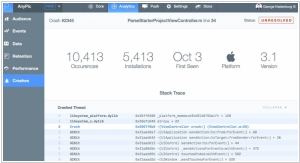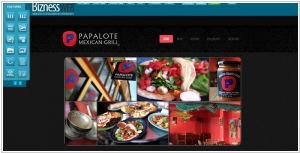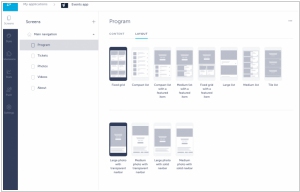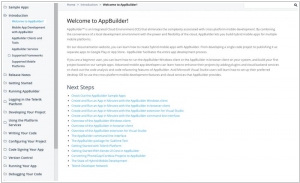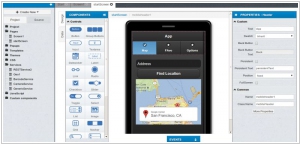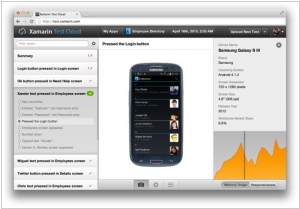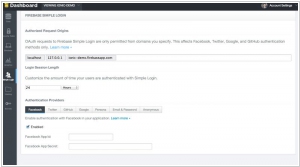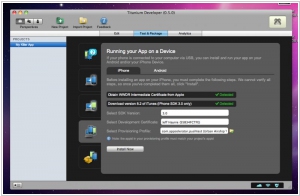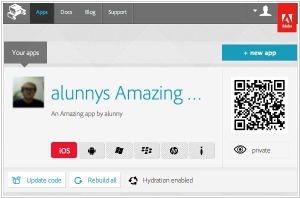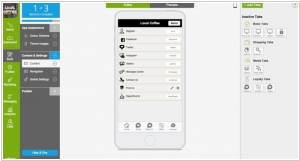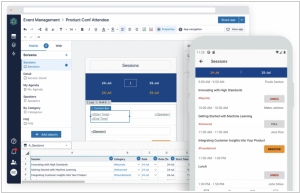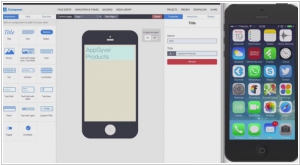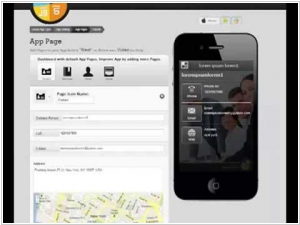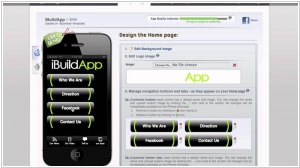Top 10 Mobile Application Development Platforms
February 03, 2024 | Editor: Sandeep Sharma
15
Mobile Application Development Platforms allow to quickly build, test, run and manage native mobile apps.
1
Appy Pie's No-code Application Development Platform Software provides drag-and-drop tools that enable businesses to design, develop, integrate mobile and web applications quickly without coding.
2
The Ultimate App Creator for iOS & Android. Build mobile apps in a fraction of the time and cost using BuildFire’s powerful and easy to use mobile app builder platform.
3
The most powerful App Builder to create your iOS, Android app and PWA. Easily create a Shopping App or a Content Management App. No technical knowledge required.
4
The complete mobile app platform. Focus on creating unique & engaging apps on any platform. We take care of everything else your app needs, from the core of your app to analytics and push notifications.
5
The #1 App Builder for Small Business. Using our do-it-yourself platform, scan your website for content and fill in any additional information. Choose our premade templates or start from scratch. Quickly build Native iOS, Android and Mobile Websites.
6
Shoutem is the most efficient app development platform. Save time and money when creating apps by using modular building blocks called extensions
7
Free and open source, Ionic offers a library of mobile-optimized HTML, CSS and JS components for building highly interactive apps. Built with Sass and optimized for AngularJS. The beautiful, open source front-end framework for developing hybrid mobile apps with HTML5.
8
Accelerate Mobile Innovation in the Enterprise. The only cloud-based platform with visual development tools and integrated backend services. Build iOS, Android, Windows Phone, and HTML5 Mobile Apps
9
Microsoft owned free cross-platform open-source app platform for building Android and iOS apps with .NET and C#.
10
Google Firebase is a realtime backend as a service that allows you to create incredible apps. Save, Store and Update Data in realtime. Build realtime mobile and web apps in minutes using client-side code and our powerful API. Save time. Delight your users.
11
Everything you need to create great, native mobile apps—all from a single JavaScript code base.
12
Build great apps powered by open web standards. Cut down on development time by re-using your existing web dev skills, frameworks and tools. Get all the benefits of cross-platform development while building apps just the way you like. Easily create apps using the web technologies you know and love: HTML, CSS, and JavaScript.
13
App Builder for busy small business owners. Build Android and iOS apps quickly and without writing a single line of code.
14
Build a better way to work. You need to manage your tasks, your projects, and your team. Now you can build an app to achieve your goals with Amazon Honeycode. No programming required.
15
AppGyver most advanced platform for building hybrid mobile apps with HTML5. We've selected the best of what HTML5, native APIs and the top frameworks have to offer. We've then modified, improved and re-imagined them to bring you the best blend possible.
16
Build an iPhone App Online, SeattleClouds.com - online native app builder, iPhone app template, Restaurant app, Business App.
17
Create an app for your business with intuitive editor. Customize app's look and feel: edit layout, images, buttons and color schemes. Add functional features, fill in your content Review and test your app on a mobile device
Latest news about Mobile Application Development Platforms
2023. Modular app-building platform Builder.ai raises $250M
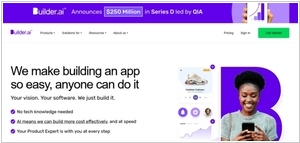
Builder.ai, the startup that recently entered into a strategic partnership with Microsoft to introduce its "Natasha" AI on Microsoft Teams, has successfully secured $250 million in Series D funding. Builder.ai provides businesses, whether small or large, with a modular approach to constructing web or native mobile applications. The company has established collaborations with prominent entities such as JP Morgan & Chase, Etisalat UAE, and various technology and financial enterprises. Recognized as one of the Most Innovative Companies in Fast Company's 2023 list, Builder.ai was also honored as the "Scale Up of the Year" at the 2022 Europas awards.
2022. Thunkable raises $30M for its no-code mobile app development platform
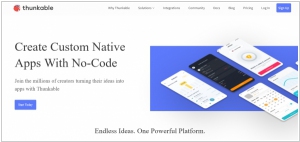
Thunkable, a platform that offers a range of "no-code" tools for app development, has secured $30 million in Series B funding. Numerous apps already exist, and more are being created, to enable the building of mobile apps without requiring coding skills. Among these are well-funded initiatives such as FlutterFlow and AppyPie, as well as Builder (which recently raised $100 million), Universe (also backed by venture capital), Kooply (focused on gaming and currently in stealth mode), and several others. Even industry giants like Amazon are interested in entering this space. However, Thunkable believes it has successfully overcome the challenges associated with no-code app development.
2021. Wix launches a no-code app builder for $200 per month
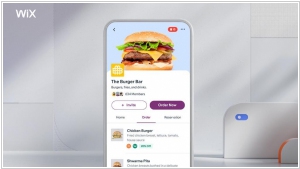
Wix has introduced a new offering called Branded App by Wix, specifically designed for business owners who want to create native apps effortlessly, without the need for coding skills. While Wix is renowned for its drag-and-drop website builder, it now expands its user-friendly platform by enabling anyone to build their own app. The introduction of Branded App by Wix allows users to manage their online presence comprehensively, providing tools to develop and customize apps. Although it comes with a significant investment of $200 per month, users should also consider additional costs such as a yearly $99 fee for the App Store and a one-time $25 fee for Google Play. According to Wix, leveraging native mobile apps can significantly boost sales for businesses in the long run.
2020. AWS launches Amazon Honeycode - no-code mobile and web app builder
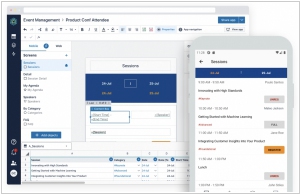
AWS has recently launched Amazon Honeycode, a novel, fully managed development tool that focuses on low-code/no-code capabilities, enabling individuals within an organization to easily create their own applications. This powerful tool leverages an AWS-backed database and a user-friendly, web-based interface builder with drag-and-drop functionality. Similar to other comparable tools, Honeycode offers users a selection of pre-designed templates for common use cases such as to-do lists, customer trackers, surveys, schedules, and inventory management. Developers can create applications for up to 20 users without any charges. Subsequently, they pay per user and for the storage space consumed by their applications.
2017. Xamarin now lets run and test iOS apps directly from Windows
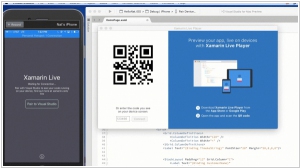
Until now, Xamarin by Microsoft has enabled developers to create iOS applications within Visual Studio. However, building and testing these apps still required a Mac. The introduction of Xamarin Live Player changes this scenario by allowing developers to deploy, run, test, and debug iOS apps directly from a Windows PC running Visual Studio. To utilize this new functionality, developers need to install the Xamarin Live Player app on their iOS device and pair it with their PC by scanning a QR code displayed on their screen. By offering this capability, Microsoft is bridging the gap for most developers and moving closer to its goal of positioning Windows 10 as the preferred operating system for cross-platform development.
2016. Microsoft launched its no-coding app builder
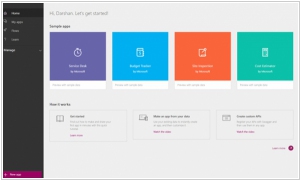
Microsoft has introduced a new service called PowerApps, enabling individuals to create basic business apps without requiring any coding skills. These apps are compatible with both web and mobile platforms, including the PowerApps apps for iOS and Android. Developing apps in PowerApps primarily involves a drag-and-drop approach. While the service provides an online dashboard, the actual design work is performed using a Windows 10 desktop app. Additionally, PowerApps offers several pre-designed templates for common use cases. Although building new apps from scratch is generally straightforward, it may not be as effortless as portrayed in Microsoft's marketing materials.
2016. Microsoft's development platform Xamarin integrates with Visual Studio
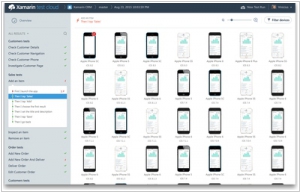
Following its recent acquisition by Microsoft, Xamarin, the cross-platform development platform, has released updates to enhance almost all of its core features. Xamarin has made its SDKs for Android, iOS, and Mac open-source under the MIT license. These SDKs encompass command-line tools for application development, as well as the cross-platform Xamarin.Forms UI framework. However, the Xamarin IDE for Mac will remain closed-source at present. Many of the new functionalities are integrated with Microsoft's tools, particularly Visual Studio. For instance, iOS developers can now utilize Xamarin's iOS Simulator directly from Visual Studio on Windows, though the simulator itself still requires a networked Mac and Visual Studio establishes a remote connection to it. Additionally, Visual Studio/Xamarin users can deploy apps to iOS devices connected to the Windows machine's USB port directly from Visual Studio.
2016. Microsoft acquired mobile development service Xamarin
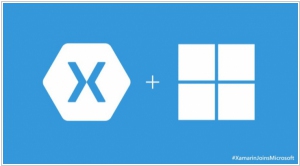
Microsoft has acquired Xamarin, a service that enables developers to create fully native applications for multiple platforms using a single shared code base. Since announcing a global partnership in 2013, Microsoft and Xamarin have collaborated closely to simplify the process of building native apps on various platforms within Visual Studio. This acquisition will significantly enhance Microsoft's collection of developer tools and facilitate the growth of mobile and Universal apps for Windows 10 devices. The integration of Xamarin, Visual Studio, Visual Studio Team Services, and Azure will offer a comprehensive solution for mobile app development, encompassing everything necessary to create, test, deliver, and monitor mobile apps across all devices.
2016. OutSystems raises $55M for its app delivery platform

OutSystems, the platform that facilitates the rapid development of mobile business apps for enterprises, has recently secured a funding round of $55 million. With OutSystems, developers in the enterprise sector can swiftly create applications that seamlessly integrate with various third-party business applications, including renowned platforms like SAP, Salesforce.com, and Workday, among others. At the heart of the service lies a graphical development tool, which generates code that developers can further extend. However, in many instances, OutSystems users can accomplish their objectives without the need to directly engage with any code, making the platform highly accessible and user-friendly.
2015. Bizness Apps launched a new white-label App Builder
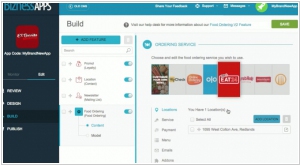
Small business mobile apps builder, Bizness Apps, is introducing Apex, a comprehensive revamp of their app builder platform. The newly developed platform aims to streamline the app development process, integrating design, app building, and marketing into a single web-based platform. In essence, Apex provides web professionals with all the necessary tools to swiftly create interactive apps for their clients. Distinguishing itself from the norm, Apex offers builders the flexibility to effortlessly incorporate interactive modules such as loyalty programs, ordering systems, and location-aware features. Additionally, the platform empowers builders to customize various aspects of the app's appearance, including fonts and colors. Apex also simplifies the submission process to iOS and Android app stores and offers builders post-approval features like push notifications and engagement tracking.
2015. Xamarin improves its mobile app development platform
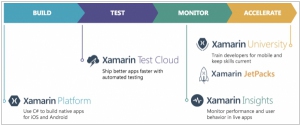
Xamarin, the platform for cross-platform mobile app development with a focus on C#, has unveiled its latest version. This update brings forth a range of new features across Xamarin's suite of tools, which now encompasses frameworks, emulators, mobile app testing services, and analytics. The primary objective is to simplify the overall service and offer developers a more unified experience throughout Xamarin's expanding array of tools and services. As an example, users of Xamarin Studio and Visual Studio can now directly access tests on the Xamarin Test Cloud from their integrated development environments (IDEs). Additionally, the code required for implementing the Xamarin Insights app monitoring service, which aids in identifying performance issues and crashes, is now automatically integrated into project templates. Alongside this update, Xamarin is also making Insights available for general use.
2014. Mobile app builder Parse adds crash reporting and local datastore
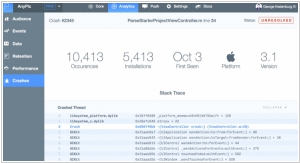
Parse, the mobile development platform that was acquired by Facebook last year, provides developers with a comprehensive set of features. However, one crucial aspect that was missing until now was crash reporting. While Parse offers an analytics service, developers had to rely on third-party tools to track app crashes. Fortunately, today, this much-needed feature has been made available. Another exciting addition is the support for Parse's local datastore on iOS, which was previously only available for Android. This framework enables developers to facilitate the use of critical app features even when users are offline, making it easier to deliver a seamless experience.
2014. Mobile app builder AppGyver acquired competitor AppArchitect
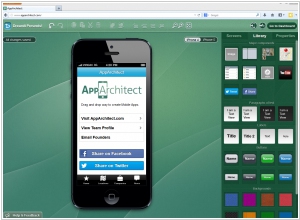
AppGyver, a mobile app development company, has recently acquired AppArchitect, a provider of app-building tools with a drag-and-drop, no-code interface. The details of the acquisition were not disclosed. AppGyver is renowned for its development of Steroid.js, a command-line tool for swiftly creating HTML5 apps, along with their own drag-and-drop composer. Similarly, AppArchitect offers a drag-and-drop composer specifically for iOS apps, eliminating the need for coding experience. Both companies offer a comparable app composer tool, and through AppGyver's backend cloud services, AppArchitect users can now venture into Android app development. To kickstart the acquisition process, the teams have launched AppArchitect 2.0, featuring a fresh flat design, complete support for Android, and new premium functionalities such as comments and video channels.
2014. App builder Parse adds A/B testing for push notifications
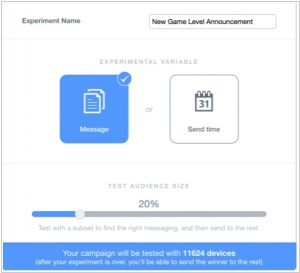
The latest feature being introduced by Parse, a subsidiary of Facebook, is called Parse Push Experiments. This feature is specifically targeted towards marketers and developers utilizing the Parse SDKs in their applications. It enables them to conduct A/B tests on various messages and timings for push notifications sent to mobile devices. The update seamlessly integrates with apps that are already using the most recent versions of the Parse SDKs, requiring no modifications from the developers' end. Instead, a new option has been added to the push composer in the Parse web console, allowing users to access A/B testing capabilities. According to Parse, over the past month, they have dispatched a staggering 2.4 billion mobile push notifications. Incorporating A/B testing into such a massive distribution system will undoubtedly have a significant impact on how and when millions of individuals choose to engage with their devices.
2014. Progress Software buys mobile development platform Telerik

Progress Software has made an announcement regarding its acquisition of Telerik for a total of $262.5 million. Telerik's impressive portfolio includes a .NET toolbox, a mobile development platform, and a content management system (CMS) called Sitefinity. Additionally, Progress will gain access to Telerik's extensive developer community, which boasts a membership of over 1.4 million individuals. Describing itself as a company that simplifies the development, deployment, and management of business applications across various platforms and devices, connected to any data source, Progress has been actively expanding its capabilities. In recent times, it acquired Rollbase, a Platform as a Service (PaaS) provider, and also purchased Modulus, which allowed it to venture into the realm of Node.js. The acquisition of Telerik aligns with Progress' strategic goals, enhancing its user interface (UI) capabilities and complementing its existing toolset.
2014. Google acquires mobile app builder Firebase
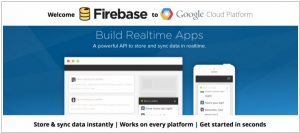
Google has completed the acquisition of Firebase, a backend service renowned for aiding developers in creating real-time applications for iOS, Android, and web platforms, enabling instantaneous data storage and synchronization. The Firebase team assures that the service will continue to operate as usual, retaining its platform-agnostic nature. While primarily driven by Google's interest in the technology and talent associated with Firebase, this acquisition also presents an opportunity for Google to introduce Firebase's extensive developer community of over 100,000 to its Cloud Platform. This marks the third significant acquisition by Google for its Cloud Platform this year, following the integration of monitoring service Stackdriver and the addition of Zync to bring visual effects rendering to its cloud computing service.
2014. Enterprise mobile app platform Kinvey gets $10M funding
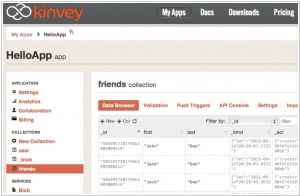
Mobile development platform for businesses, Kinvey, has secured $10.8 million in new Series B funding. This funding will be utilized by the Boston-based company to support product development, drive enterprise sales, and establish additional channel and integrator partnerships. The unique selling point of mobile-focused platforms such as Kinvey, AnyPresence, or Parse is their ability to provide mobile-first developers with specialized capabilities tailored to their requirements, surpassing the offerings of more generic Platform-as-a-Service (PaaS) providers. By choosing Kinvey over a standard PaaS solution, developers can bypass the need to navigate through intricate details of relevant APIs to build their applications, as much of the higher-level work is already completed as part of the Kinvey service. However, it's worth noting that many PaaS providers are incorporating more mobile-specific services, blurring the distinction between mobile-focused platforms and traditional PaaS offerings. Additionally, major cloud providers like Microsoft Azure and Amazon Web Services have introduced their own incentives designed specifically for mobile developers.
2014. iBuildApp allows to create mobile app for your business in 5 minutes
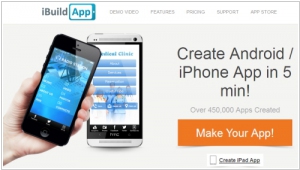
Why your business needs a mobile app? First of all - it can serve as a mobile version of your website. You probably know that a lot of customers come to your site via phones? So, it would be very convenient for them to read your news, promotions and access information about your products / services in the beautiful and simple mobile interface. For example, restaurant's app may contain today's menu and a form for booking a table. Online service IBuildApp allows to create such a mobile app (for iPhone, iPad, Android) in visual designer in few minutes. And information in the app can be updated automatically via integration with your site - iBuildApp provides a number of tools for this (widgets, RSS). There is also an opportunity to create a mobile version of your online store using a special module. ***

